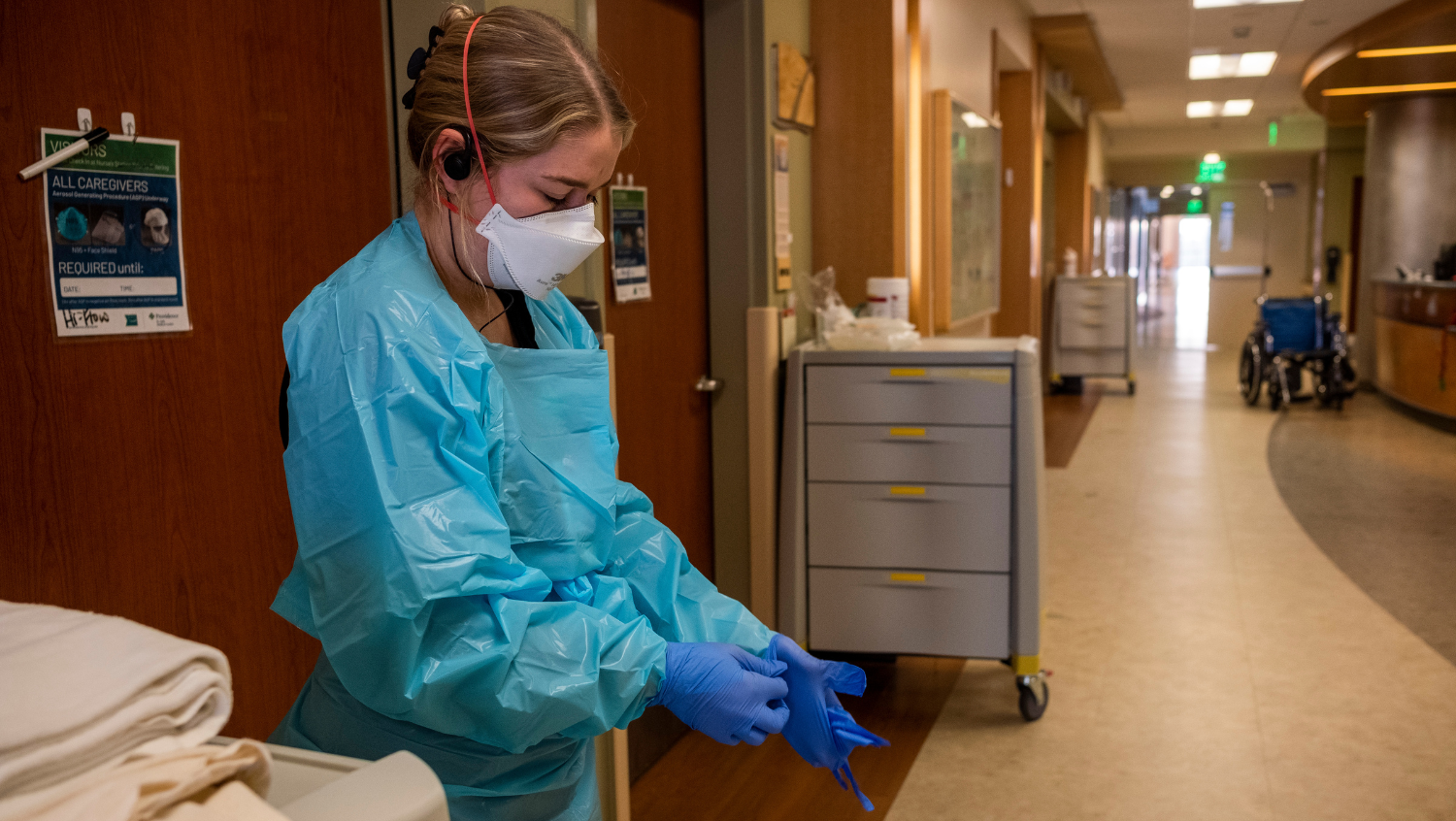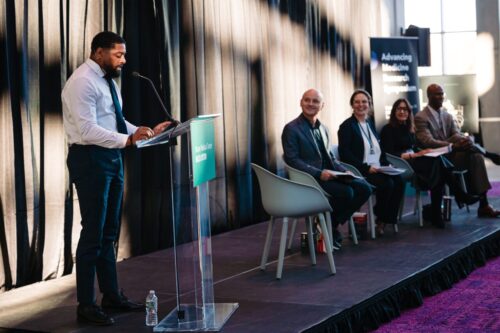What's the Risk of Mpox to Healthcare Workers?
September 15, 2022
By Glory Ruiz, MD, By Cassandra M. Pierre, MD, MPH, By Samantha Johnson

Francine Orr, Getty Images
Amid growing concerns in the healthcare community, BMC's experts set out to alleviate fears about mpox while balancing valid concerns.
On Friday August 5, the U.S. declared mpox, then called monkeypox, a public health emergency. In response, Cassandra Pierre, MD, MPH, infectious disease physician, medical director of Public Health Programs and the associate hospital epidemiologist at Boston Medical Center (BMC); Glory Ruiz, MD, the director of public health programs at BMC; and Samantha Johnson operations manager of public health outreach, education, and prevention sat down for a roundtable discussion about mpox, common misconceptions, prevention, the mpox vaccine, and more. Marquis Jamison, program manager of HIV/STI prevention & screening contributed information to this discussion.
This is part three of that discussion. Click here for part one and for part two.
How can healthcare workers protect themselves from mpox?
Samantha Johnson: The questions we get from healthcare workers on mpox are similar to what we’re getting from patients. There’s this general uneasiness among healthcare providers because there is not a lot of information that they feel is easily accessible.
The questions go back to how mpox has been presented to the public. In the case of emerging diseases, healthcare workers are often just another part of the general public, which is also why there’s a lot of misinformation and misconstrued facts. In fact, we get calls from outside healthcare providers who are in private practice, because there just isn’t a great mechanism for mass, trusted communication.
Cassandra Pierre, MD: Let’s be clear and provide concerned healthcare providers with the necessary information. Here are the scenarios where a worker would be at risk of mpox:
- If you are seeing a patient who has an open lesion and you touch that open lesion with your bare hand
- If you’re having prolonged, face-to-face exposure without a mask for more than three hours with a patient with mpox
- If you’re handling clothing, bedsheets, towels, or any linens of a patient with mpox and you, as a worker, have an open wound of your own
Let’s walk through those scenarios one by one. A healthcare provider is never recommended to touch a patient’s open lesion with a bare hand because that falls under standard precaution procedures. You would always wear gloves, and often a gown, in that scenario. That is enough to protect themselves from unintended exposure.
In the second scenario, again most healthcare workers wouldn’t have face-to-face contact for more than three hours at once, which is what is needed to even qualify as exposure. And if so, the appropriate PPE, including a mask, is very protective.
In the third scenario, with the linens, always cover an open wound and wear PPE if you have to enter the room of a person with a contagious infection. That’s standard as well.
HealthCity: So bottom line, what is the risk of exposure to mpox for healthcare workers?
CP: I’m comfortable saying that the risk is going to be a lot lower than it is for COVID-19. It will be very hard to meet the burden of a true exposure as a healthcare worker. We as healthcare workers have all the tools at our disposal to prevent exposure. We know that our PPE is protective, especially if you know ahead of time an individual is infected with or suspected to have mpox.
What should healthcare workers do if they are exposed to mpox?
HealthCity: Whether on the job, where the risk is low, or in their personal time, what should a healthcare provider do if they are exposed to mpox?
SJ: If you believe you have exposure, get in touch with your occupational healthcare provider—here at Boston Medical Center we advise calling your BMCHS Occupational Health clinician. They will advise on next steps and if vaccination is needed.
In my experience, most of our healthcare workers—because we have great PPE protocols already in place because of COVID-19—just require monitoring and don’t require mpox vaccination based on their exposure.
HealthCity: And if a healthcare provider has tested positive for mpox, what comes next for them?
SJ: It’s the same advice as for patients: Isolation while you have a rash and keep your rash covered so you don’t risk skin-to-skin contact.
HealthCity: How long can that isolation be?
Glory Ruiz, MD: The recommended isolation for mpox can be anywhere from two to four weeks once you are symptomatic. This is different from the five days you are advised to isolate after testing positive for COVID-19. (Days 6 to 10, patients can leave isolation and continue to wear a mask.) With mpox, individuals are advised to isolate until all symptoms have resolved. A person who develops a rash is contagious until after all the scabs on the skin have fallen off and a fresh layer of intact skin has formed. We know this longer isolation is not affordable or possible for everybody — that’s the challenge. That’s the conundrum that the healthcare system is in.
What about the mpox vaccine for healthcare providers?
CP: We’ve been getting a lot of requests for preexposure prophylaxis from healthcare workers who are just concerned about mpox. Maybe they’re in undifferentiated spaces like the emergency department, or they work in a lab, or they are actually sampling or have the possibility of sampling individuals who have mpox.
GR: We are currently not mass vaccinating healthcare workers.
This guidance is in contrast to the prioritization of the COVID-19 vaccines for healthcare workers—but that was because we were at higher risk of exposure for COVID-19 than the general public. That is not the case with mpox. It’s a different illness with different exposure risks than COVID-19.
As Dr. Pierre said, there is a risk with prolonged respiratory exposure — but not if you’re wearing a mask, which healthcare settings are doing anyway. The same with PPE for skin-to-skin contact.
CP: This concern is also just human behavior. If there’s something new, you want to be protected against it. Even though mpox is not a true novel disease, to be clear, it’s just human nature to be fearful of something you’re less familiar with.
HealthCity: What would you say to healthcare workers concerned that they aren’t getting pre-exposure access to the mpox vaccine?
CP: The bottom line is that the threshold for credible exposure to infectious diseases across the board is based on the risk of transmission. Mpox has a much higher threshold for exposure before healthcare workers meet that burden. That’s why we don’t need prioritized, pre-exposure access to the mpox vaccine.


